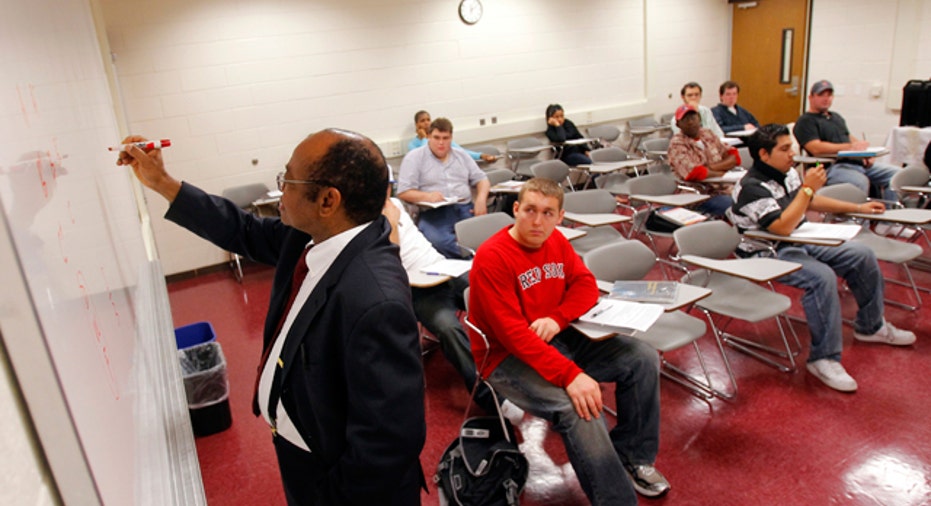Getting College Credit in High School: Worth It?

As colleges continue to up the ante for admission, high school students are preparing for college before their senior year by exploring post-secondary curriculum options.
According to a 2010 study conducted by The College Board, only 49% of high school seniors polled report that their school did a good job in preparing them for success in both college and the workplace.
“Many first-year college students drop out of school because they are unprepared to adjust to the academic rigors of life on campus,” says Erin Davis, director of College Solutions at McGraw-Hill Higher Education.
Auditi Chakravarty, executive director of AP Curriculum & Assessment for The College Board, says that post-secondary choices, or academically-rigorous programs and classes allowing high school students to earn credit for college, can put incoming freshmen ahead of the game as they prepare for college.
“What makes them challenging is not only the amount of work, but also the type of work that students will be asked to do,” she says. “The pace, the amount of reading and writing, the types of lab experiences, and the research and other projects required are similar to what students can expect in college.”
From the additional workload, time commitment, and the cost of post-secondary options, we talked to the experts about what rising college students should consider for getting a head start.
Different options
There are a variety of ways that students can earn credit for college, such as dual enrollment (students spend half the day at high school, the other at a college campus), direct credit (a college professor or high school teacher teaches college courses), or summer college courses that give students college credit.
High schools are also increasingly offering Advanced Placement (AP) or International Baccalaureate courses (IB) to students that many colleges accept as replacements to introductory courses if they score high enough on the exam.
“AP and IB courses help students prepare for college coursework by providing a preview of the critical thinking and problem-solving students need during their freshman year of college,” says Davis.
Who should consider post-secondary
The experts agree that students need to assess their capabilities before taking on advanced courses.
“How much time do they have? By taking an extra course or a more advanced course, how much are they going to spread themselves too thin?” says Jon Reider, director of college counseling at San Francisco University High School. “The key words are balance, perspective and self-knowledge.”
Before signing up for advanced courses, Davis suggests students inventory their existing workload to make sure they have time and energy for the class. These classes require more study and work time than typical high school courses.
“Students should speak to their parents and/or college counselor about AP and IB course requirements, offerings, and the subjects that may work best for that student. Ask questions and understand the workload that lies ahead,” Davis says.
Become better prepared for college-level classes
“Research tells us that students who succeed on even one AP exam tend to have better college outcomes—such as [a] higher first-year and four-year GPA—than similar students without that AP experience,” Chakravarty says.
In addition to being more prepared for a college workload, students have the opportunity to rack up some credits to gain some flexibility with their future course choices.
“[You can] get started on courses directly related to your major (the fun stuff) more quickly, which in turn allows you to investigate your real interests while still graduating on time,” says Davis.
Cost
As the cost of college tuition continues to soar, Davis points out that taking college-level classes in high school can significantly reduce a tuition bill.
“By scoring a four or five on an AP or IB exam, students can receive college credit and opt out of taking the course in college, which can save hundreds or thousands of dollars,” she says. “In fact, if a student obtains a four or five on several AP exams, he or she could potentially earn enough credit for an entire semester and/or allow for a student to complete college on-time or at an accelerated pace.”
Although students usually incur exam costs, the College Board and many states and districts offer fee subsidies. Students should speak with their program coordinator or guidance counselor to learn more about fee reduction options.
Factors to be aware of
Universities’ policies vary for what is accepted for credit, and some don’t accept these classes at all.
Reider recommends that students consider taking classes that interest them, possibly helping to decide on a major or degree program.
“Are you generally interested in the subject or are you just trying to score brownie points with some college? Don’t do it just to get into college--do it because it’s actually valuable to your development.”



















